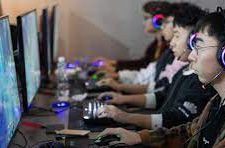Introduction
Online gaming has transcended its status as a mere form of entertainment and has become a cultural phenomenon. As millions of individuals immerse themselves in virtual worlds, it is natural to wonder about the psychological aspects behind this captivating pastime. Are you ready to take your gaming skills to the next level? betso88 offers competitive online gaming tournaments. In this article, we will delve into the mind of a gamer and explore the psychology of online gaming, examining the motivations, emotions, and cognitive processes that drive players to engage in this dynamic and immersive activity.
Motivations and Goals
Understanding the motivations behind online gaming is key to comprehending the psychology of gamers. People engage in online gaming for various reasons, including:
Achievement and Competition
Many gamers are driven by the desire to achieve success and demonstrate their skills. The competitive nature of online gaming provides a platform for players to strive for mastery, surpass challenges, and attain recognition. The pursuit of achievements, leaderboard rankings, and in-game rewards fuels motivation and enhances the gaming experience.
Social Interaction and Connection
Online gaming offers a unique avenue for social interaction, allowing individuals to connect and bond with others who share similar interests. The social aspect of gaming satisfies the basic human need for belonging and fosters a sense of community. Gamers form friendships, join clans or guilds, and engage in cooperative or competitive gameplay, creating social connections that extend beyond the virtual realm.
Escapism and Fantasy
For many gamers, online gaming serves as an escape from the pressures and realities of everyday life. The immersive virtual worlds, rich narratives, and fantastical settings provide an opportunity to step into a different reality, assuming roles and identities that differ from their offline personas. Online gaming offers an outlet for relaxation, stress relief, and a temporary respite from real-world challenges.
Emotional Experience
Emotions play a significant role in the gaming experience, shaping a gamer’s journey and level of engagement. Online gaming can evoke a wide range of emotions, including:
Excitement and Thrill
The exhilaration of triumphing over a formidable opponent, completing a challenging quest, or achieving a long-awaited goal can elicit feelings of excitement and thrill. The dynamic and unpredictable nature of online gaming keeps players on their toes, heightening their emotional responses and adding an extra layer of intensity to their experiences.
Frustration and Anger
Online gaming is not without its frustrations. Facing defeat, encountering obstacles, or experiencing technical issues can trigger feelings of frustration and anger. The competitive aspect of online gaming can also lead to heated interactions with other players. Managing and regulating these negative emotions becomes essential for maintaining a positive gaming experience.
Social Connection and Fulfillment
The social interactions within online gaming can evoke a sense of fulfillment, satisfaction, and joy. Collaborating with teammates, supporting each other, and achieving shared objectives can foster a sense of camaraderie and accomplishment. Positive social experiences contribute to overall well-being and enhance the emotional rewards derived from gaming.
Cognitive Processes
Online gaming engages a range of cognitive processes, stimulating the mind and promoting mental acuity. These cognitive processes include:
Problem-Solving and Strategic Thinking
Many online games require players to analyze complex situations, develop strategies, and make decisions in real-time. Engaging in problem-solving and strategic thinking exercises the brain, enhancing cognitive flexibility, adaptability, and critical thinking skills.
Focus and Attention
To succeed in online gaming, players must maintain focus and sustain attention over extended periods. The fast-paced nature of gaming environments demands quick reflexes and the ability to process and respond to multiple stimuli simultaneously. Training in sustained attention can carry over to other aspects of life, enhancing productivity and concentration.
Spatial Awareness and Coordination
Navigating virtual landscapes and engaging in gameplay often necessitate spatial awareness, hand-eye coordination, and motor skills. These cognitive processes contribute to enhanced spatial reasoning and fine motor control, potentially benefiting individuals in real-world tasks that require similar skills.
Conclusion
The psychology of online gaming encompasses a complex interplay of motivations, emotions, and cognitive processes. Gamers are driven by achievement, social connection, and the allure of escapism. Emotionally, they experience excitement, frustration, and fulfillment. The cognitive demands of online gaming promote problem-solving, focus, and coordination. By understanding the psychological aspects of gaming, we can appreciate the depth and significance of this immersive form of entertainment. Online gaming provides a multifaceted experience that not only entertains but also engages the mind and fosters social connections, making it a compelling and impactful activity in the modern world.
